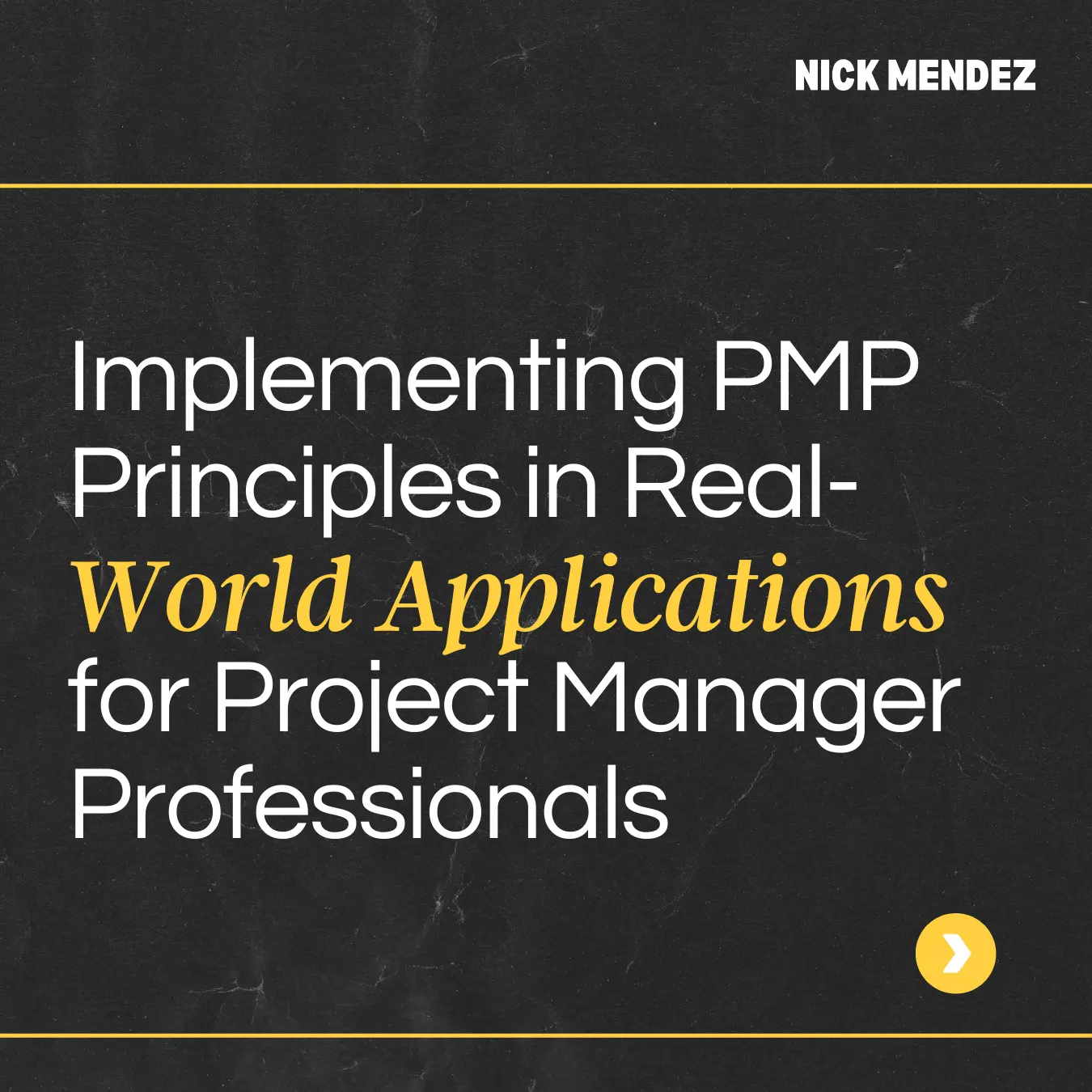Implementing PMP Principles in Real-World Applications for Project Manager Professionals
Table of Contents

About the Author – About Nicholas Mendez (Nick Mendez):
Nicholas Mendez (Nick Mendez) is a 26-year-old tech professional with 5+ years of cyber security, and technology project management experience. He earned his PMP certification on April 30, 2023, marking a significant milestone in his career. Since then, he’s written many guest posts and blog posts where readers have received a great amount of value and knowledge to prepare for their PMP exam.
Check out his FREE exclusive top-notch PMP study resources at teachmeit.co and nickmendez.co and get ready to take your career to the next level!

The Project Management Professional (PMP) credential is a shining example of project management excellence in today’s fast-paced business world. Recognized globally, this credential empowers professionals with the best practices and methodologies from PMI’s PMBOK Guide. It ensures they are well-equipped to handle complex projects with efficiency and precision.
PMP principles are extremely useful instruments with practical real-world applications, not just theoretical concepts. Project managers with PMP certification excel in delivering projects on time and within budget, effectively engaging stakeholders, mitigating risks, and achieving organizational goals. Their mastery of these principles makes them indispensable assets, ready to tackle the ever-changing challenges of modern project environments and lead their teams to success.
PMP Principle – Effective Project Initiation Strategies
Have you ever considered how a good project charter can set the stage for success right from the start? By establishing clear, attainable goals, this foundational document outlines the project’s objectives, scope, key stakeholders, and success criteria, ensuring that organizational strategies are spot on.
But here’s a crucial question: How important is early stakeholder engagement to a project manager’s success? Early stakeholder engagement is incredibly vital because it allows the project manager to understand the needs and expectations of everyone involved, identify potential risks, and build a solid foundation of support for the project. By engaging stakeholders early, project managers can ensure they’re not only aligned with organizational goals but also equipped with the insights needed to drive the project to successful completion.
Mastering Project Planning
Breaking down the project scope into manageable tasks is a critical step in effective project planning, allowing for clear assignment of responsibilities and better control over project progress. Developing realistic schedules and budgets ensures that the project is feasible and resources are appropriately allocated to meet deadlines and financial constraints. Anticipating risks with comprehensive risk management plans is essential to mitigate potential issues that could derail the project.
A project manager might break down the scope into discrete tasks like site surveys, design approvals, and construction phases when organizing a community infrastructure project, for instance. They would then create a detailed schedule and budget, accounting for materials, labor, and contingencies, while also identifying and planning for risks such as regulatory changes or unexpected site conditions. This structured approach ensures the project remains on track and within budget, delivering the desired outcomes to the community.
The Action Phase: Seamless Project Execution
Making sure resources are allocated effectively and the team is well-coordinated is key to a smooth project. It ensures that the right people and tools are in place when needed and that everyone is working towards the same goals. Keeping communication open with stakeholders is vital to keep everyone in the loop, address any issues quickly, and make sure their needs are met. Quality assurance processes help keep the project on track and ensure that everything meets the required standards.
For example, when running a nationwide marketing campaign, the project manager would assign resources like media buyers, designers, and marketing teams and coordinate their efforts to ensure everything runs smoothly. Regular updates and feedback from stakeholders, including clients and internal departments, help keep the campaign aligned with expectations. Quality checks, such as regular reviews and performance metrics, ensure the campaign is effective and meets brand standards, ultimately achieving the desired impact.
Monitoring and Controlling Projects To Stay On Course
Project managers can evaluate accomplishments against key performance indicators and make data-driven decisions by using performance metrics to monitor project progress, which is crucial for keeping a project on schedule. Efficiently managing scope changes and budget adjustments is crucial for adapting to evolving project needs without compromising overall objectives. Proactive risk management involves identifying potential issues early and implementing strategies to mitigate their impact, ensuring the project remains on track.
For instance, in monitoring and adjusting an IT system implementation, the project manager would use performance metrics such as system uptime, response times, and user satisfaction to gauge progress. They would handle scope changes by assessing the impact on the project timeline and budget and making necessary adjustments to resources and priorities. Proactively addressing risks like technical glitches or integration challenges through contingency planning and regular system testing would help ensure a smooth implementation and successful project completion.
Best Practices for Project Closure
Ensuring deliverables meet stakeholder expectations is critical at the project closure stage. This involves checking everything against the agreed-upon criteria and effectively communicating with stakeholders to confirm their satisfaction. Conducting thorough post-project evaluations helps in continuous improvement by assessing the project’s successes and identifying improvement areas.
Capturing lessons learned is essential for informing future projects, allowing the organization to leverage past experiences for better outcomes. For instance, when wrapping up a large-scale event planning project, the project manager would ensure every detail—from logistics to attendee experience—meets stakeholder expectations. They would conduct a comprehensive evaluation, gathering feedback from team members and participants to identify what worked well and what could be improved. By reflecting on these insights, the organization can improve its approach and achieve even better results in future projects.
Real-World Challenges and Solutions
Overcoming common obstacles like resistance to change and resource constraints requires strategic planning and effective communication. By addressing resistance through clear communication of benefits and involving team members in the change process, project managers can foster acceptance and support. Efficiently managing resource constraints involves prioritizing tasks, optimizing resource allocation, and seeking creative solutions to maximize available resources.
Leveraging stakeholder engagement is crucial for driving project success, as actively involving stakeholders ensures their needs and expectations are met, leading to stronger support and collaboration. Embracing continuous improvement and adaptability allows project managers to refine processes, learn from experiences, and quickly adjust to changing circumstances, ensuring sustained project success and resilience in the face of challenges.
Practical Tips for Project Managers
Project management software for task tracking, Gantt charts for scheduling, and risk assessment tools for identifying and mitigating potential issues are just a few of the tools and techniques that are necessary for effective project management. Staying updated with the latest PMP practices and engaging in ongoing professional development ensures that project managers remain proficient in current methodologies and emerging trends, enhancing their capability to manage projects successfully.
Building a supportive network of fellow project managers through professional organizations, online forums, and networking events promotes knowledge sharing, collaboration, and mutual support, which can provide valuable insights and resources for tackling project challenges and advancing one’s career.
Wrap Up PMP Principles
The application of PMP principles yields several advantages, such as increased project productivity, heightened stakeholder contentment, proficient risk mitigation, and regular project completion within budget and on schedule. Pursuing PMP certification is a valuable step for career advancement, as it demonstrates a commitment to professional excellence and equips project managers with the skills needed to excel in diverse and dynamic environments.
Higher project success rates and continuous improvement are nurtured by incorporating PMP methodologies into routine project management procedures, which guarantee an organized and disciplined approach. By embracing these principles, project managers can drive their teams toward achieving organizational goals and contribute significantly to their personal and professional growth.
